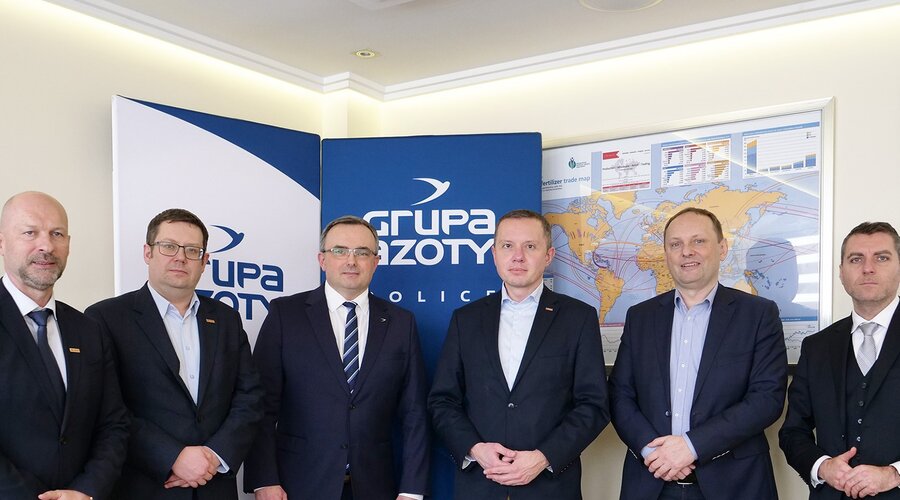KGHM and Grupa Azoty are discussing an expansion of their cooperation
The business involvement of KGHM Polska Miedź in the expansion of the Police Sea Port owned by Grupa Azoty and the ongoing cooperation in the area of sulfuric acid were the topics of discussions between representatives of the management boards of the two companies. KGHM’s representatives have expressed interest in the investment plots, which, due to their location and the planned expansion of port infrastructure, are an attractive place for investment.
The Police Sea Port is the fourth largest port in Poland in terms of transshipment volume after the Gdańsk port, the Szczecin-Świnoujście port complex, and the Gdynia port. The Sea Port area provides transportation facilities for the entire Grupa Azoty. The area provides maritime export and import capabilities, but also partly storage capabilities through a tank park for the raw materials needed for production in Police. With the launch of Grupa Azoty’s new Polimery Police complex, cargo handling at the port should increase by more than 400,000 tons per year, or approximately several dozen percent. From the perspective of the Police Port Authority, this is a major quantitative and qualitative change.
The port is currently implementing a project called “Strengthening the sustainability of the comprehensive network by increasing the accessibility and efficiency of the Police Port,” which will result in the drafting of documentation that will make it possible to start the construction of a railroad junction along with the necessary technical infrastructure as part of the construction of railroad line 437 to the Sea Port, as well as the construction of a heavy (universal) wharf. The total cost of the project is expected to be €3,477,582, of which nearly €1,740,000 will be covered by EU funds. This is because the project has been selected as part of the Connecting Europe Facility (CEF) in the 2021-2027 financial perspective.
Knowledge and cooperation - these are the business pillars on which KGHM has built its position as a world leader in copper and silver production for years. As a modern, global organization, it contributes to the sustainable development of the world. Today, the company can conquer new markets and implement ambitious investment projects related to, among other things, the energy transition. The company carries out tasks on its own, from exploration, prospecting, and acquisition of raw materials, through their extraction, production, and transportation, reaching out to customers and stakeholders, and ending with responsible waste management, so as to reduce its negative impact on the environment as much as possible.
KGHM conducts its operations in accordance with the idea of sustainable development and constantly strives to make the entire process line optimal, safe, innovative, and in line with the idea of a Closed Circuit Economy. Its actions and commitments in these areas are included in its Environmental Policy and Climate Policy, with the overarching goal of achieving climate neutrality by 2050.
Investments that contribute to the energy transition are also key for the company. KGHM seeks to diversify its energy sources, including by actively using renewable sources. By 2030, 50% of the electricity consumed by KGHM will come from its own sources, including RES. The Sierra Gorda mine is already 100% powered by renewable energy. KGHM is also very actively involved in the development of nuclear power in Poland, i.e. the construction of small modular nuclear reactors (SMRs).
In 2022, KGHM signed a preliminary work agreement with NuScale Power, LLC (a supplier of nuclear technology) as the first step in implementing the SMR technology within the KGHM Group’s business operations. Recently, the technology offered by NuScale Power was certified by the U.S. Nuclear Regulatory Commission, thus becoming the first SMR project approved for use in the United States and the seventh of all nuclear technologies. KGHM was also the first company in Poland to submit an application for the evaluation of the small modular reactor (SMR) technology to the National Atomic Energy Agency.
Grupa Azoty is a leader in the domestic fertilizer market and one of the key fertilizer and chemical industry groups in Europe. It ranks second in the European Union in the production of nitrogen and compound fertilizers, and has strong positions in markets for products such as melamine, polyamide, OXO alcohols, plasticizers, and titanium white. An important pillar of Grupa Azoty’s strategy is investment, and its largest project is Polimery Police, which is being implemented by the special purpose vehicle Grupa Azoty Polyolefins. This is one of the largest investment projects in the Polish and European chemical industry, which will enable the diversification of Grupa Azoty’s business activities, as well as will positively influence Poland’s position in the plastics segment and strengthen the country’s energy and raw material independence.
In 2021, Grupa Azoty published its strategy until 2030, which is a plan for specific actions driven by the Group’s climate and energy transition. The announced strategy is the Group’s response to the requirements of the European climate policy. Specific investment projects in such fields as industrial green energy, reduction of emissions, and decarbonization are described in the key project “Green Azoty.”



